2022年中考英语一轮复习第四课时介词专项(35张PPT)
文档属性
| 名称 | 2022年中考英语一轮复习第四课时介词专项(35张PPT) |  | |
| 格式 | pptx | ||
| 文件大小 | 6.1MB | ||
| 资源类型 | 教案 | ||
| 版本资源 | 通用版 | ||
| 科目 | 英语 | ||
| 更新时间 | 2022-04-05 14:06:38 | ||
图片预览

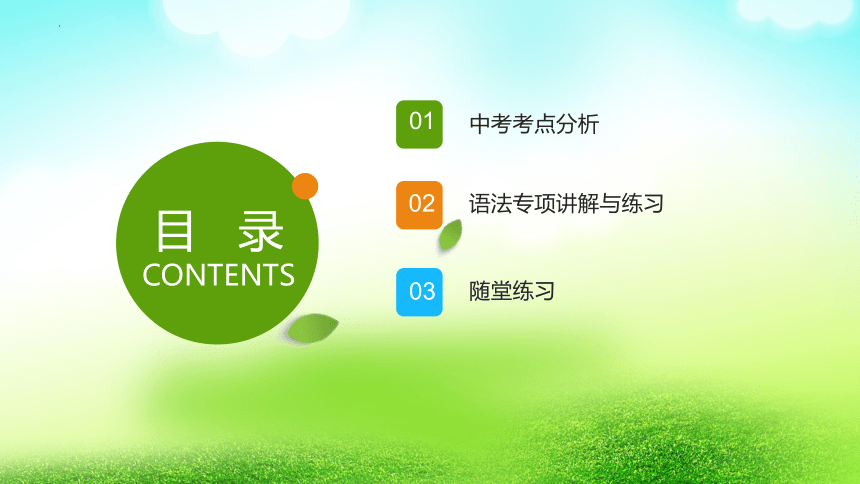

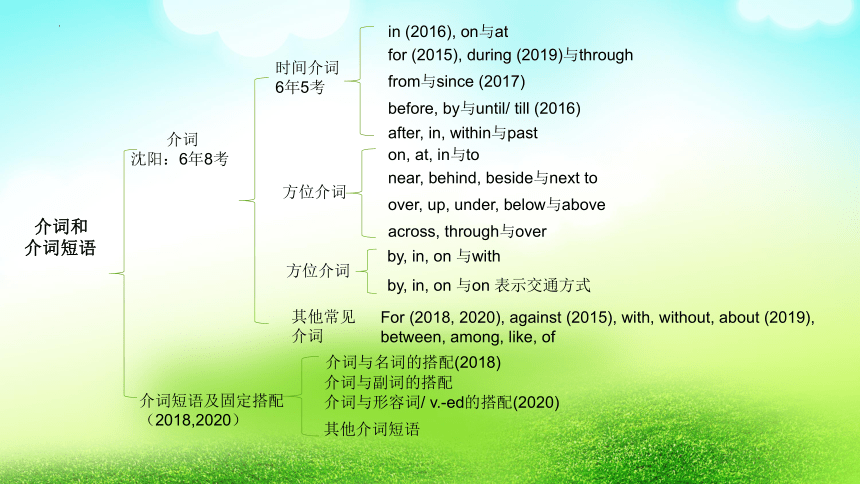
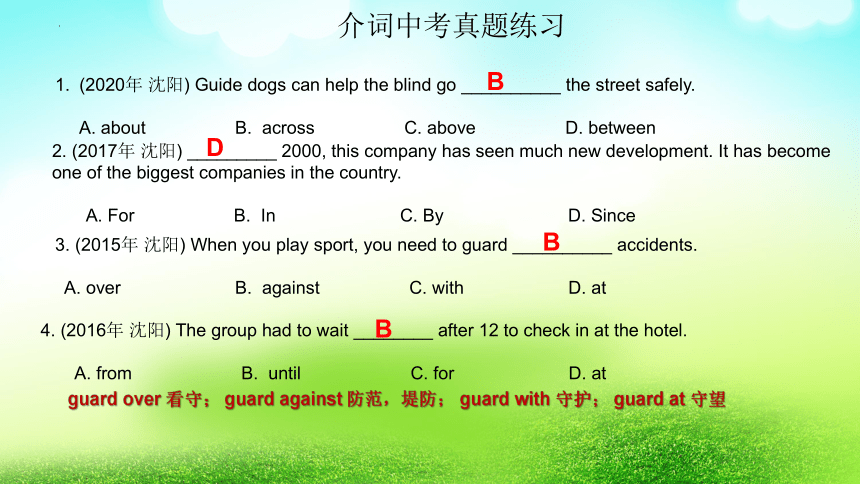
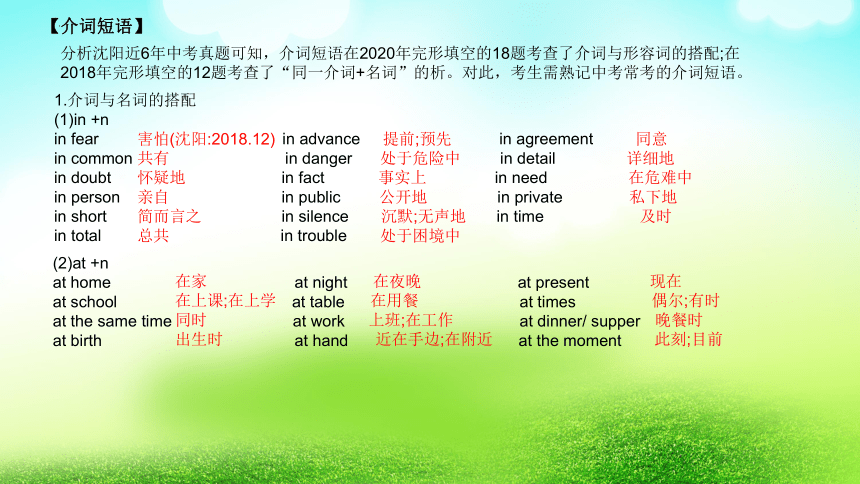
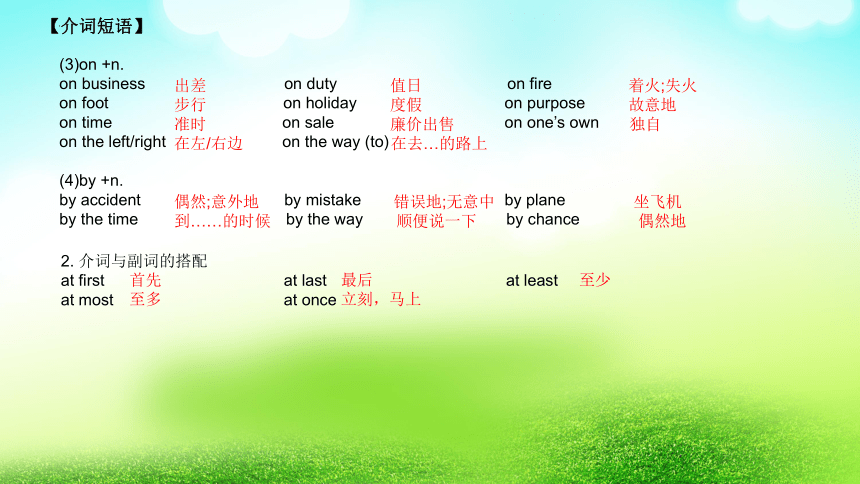
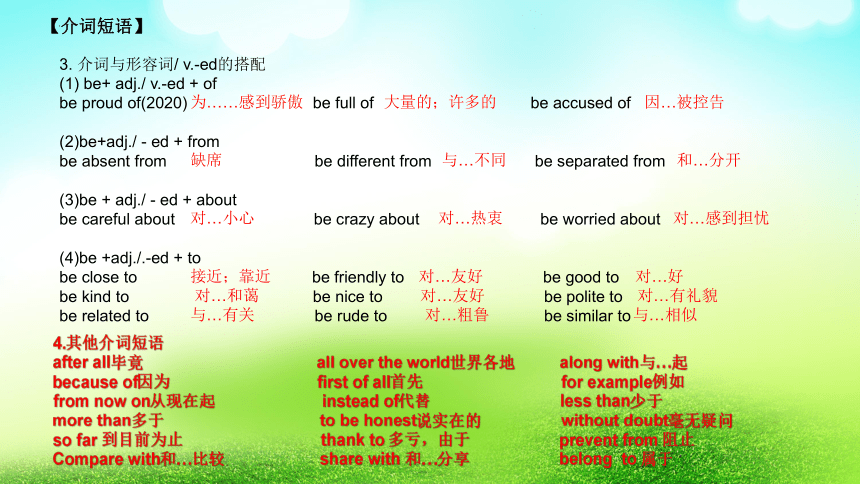


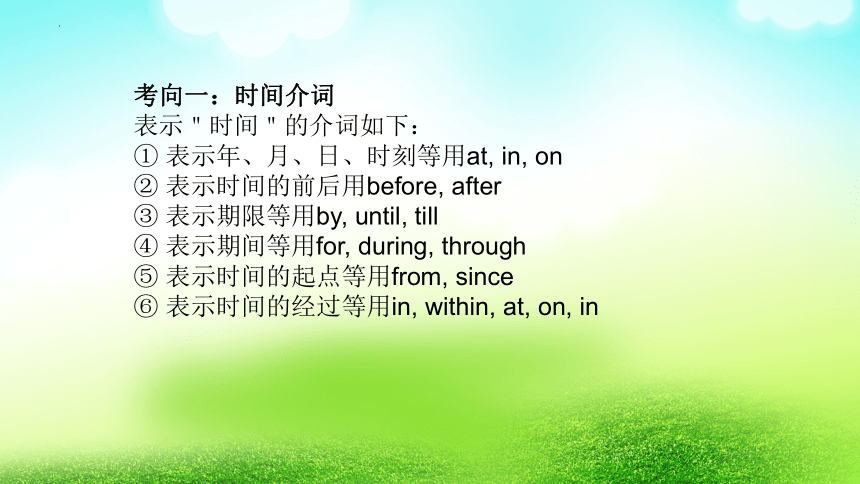
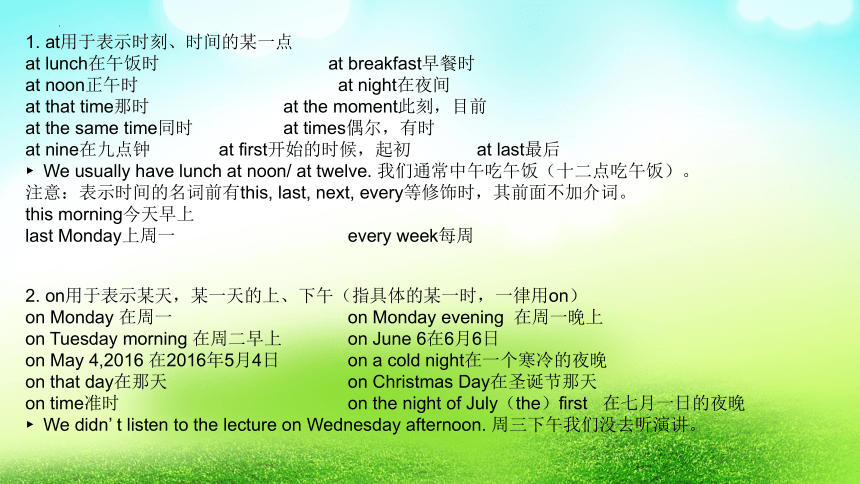
文档简介
(共35张PPT)
2022中考一轮复习英语课
第四课时介词总复习
目 录
CONTENTS
随堂练习
语法专项讲解与练习
中考考点分析
01
02
03
01
中考考点分析
介词和
介词短语
介词
沈阳:6年8考
in (2016), on与at
时间介词
6年5考
for (2015), during (2019)与through
from与since (2017)
before, by与until/ till (2016)
after, in, within与past
方位介词
on, at, in与to
near, behind, beside与next to
over, up, under, below与above
across, through与over
方位介词
by, in, on 与with
by, in, on 与on 表示交通方式
其他常见介词
For (2018, 2020), against (2015), with, without, about (2019), between, among, like, of
介词短语及固定搭配
(2018,2020)
介词与名词的搭配(2018)
介词与副词的搭配
介词与形容词/ v.-ed的搭配(2020)
其他介词短语
介词中考真题练习
(2020年 沈阳) Guide dogs can help the blind go __________ the street safely.
A. about B. across C. above D. between
2. (2017年 沈阳) _________ 2000, this company has seen much new development. It has become one of the biggest companies in the country.
A. For B. In C. By D. Since
3. (2015年 沈阳) When you play sport, you need to guard __________ accidents.
A. over B. against C. with D. at
4. (2016年 沈阳) The group had to wait ________ after 12 to check in at the hotel.
A. from B. until C. for D. at
B
D
B
guard over 看守; guard against 防范,堤防; guard with 守护; guard at 守望
B
【介词短语】
分析沈阳近6年中考真题可知,介词短语在2020年完形填空的18题考查了介词与形容词的搭配;在2018年完形填空的12题考查了“同一介词+名词”的析。对此,考生需熟记中考常考的介词短语。
1.介词与名词的搭配
(1)in +n
in fear in advance in agreement
in common in danger in detail
in doubt in fact in need
in person in public in private
in short in silence in time
in total in trouble
害怕(沈阳:2018.12) 提前;预先 同意
共有 处于危险中 详细地
怀疑地 事实上 在危难中
亲自 公开地 私下地
简而言之 沉默;无声地 及时
总共 处于困境中
(2)at +n
at home at night at present
at school at table at times
at the same time at work at dinner/ supper
at birth at hand at the moment
在家 在夜晚 现在
在上课;在上学 在用餐 偶尔;有时
同时 上班;在工作 晚餐时
出生时 近在手边;在附近 此刻;目前
【介词短语】
(3)on +n.
on business on duty on fire
on foot on holiday on purpose
on time on sale on one’s own
on the left/right on the way (to)
(4)by +n.
by accident by mistake by plane
by the time by the way by chance
出差 值日 着火;失火
步行 度假 故意地
准时 廉价出售 独自
在左/右边 在去…的路上
偶然;意外地 错误地;无意中 坐飞机
到……的时候 顺便说一下 偶然地
2. 介词与副词的搭配
at first at last at least
at most at once
首先 最后 至少
至多 立刻,马上
【介词短语】
3. 介词与形容词/ v.-ed的搭配
(1) be+ adj./ v.-ed + of
be proud of(2020) be full of be accused of
(2)be+adj./ - ed + from
be absent from be different from be separated from
(3)be + adj./ - ed + about
be careful about be crazy about be worried about
(4)be +adj./.-ed + to
be close to be friendly to be good to
be kind to be nice to be polite to
be related to be rude to be similar to
为……感到骄傲 大量的;许多的 因…被控告
缺席 与…不同 和…分开
对…小心 对…热衷 对…感到担忧
接近;靠近 对…友好 对…好
对…和蔼 对…友好 对…有礼貌
与…有关 对…粗鲁 与…相似
4.其他介词短语
after all毕竟 all over the world世界各地 along with与…起
because of因为 first of all首先 for example例如
from now on从现在起 instead of代替 less than少于
more than多于 to be honest说实在的 without doubt毫无疑问
so far 到目前为止 thank to 多亏,由于 prevent from 阻止
Compare with和…比较 share with 和…分享 belong to 属于
02
语法专项
介 词
考向一:时间介词
表示"时间"的介词如下:
① 表示年、月、日、时刻等用at, in, on
② 表示时间的前后用before, after
③ 表示期限等用by, until, till
④ 表示期间等用for, during, through
⑤ 表示时间的起点等用from, since
⑥ 表示时间的经过等用in, within, at, on, in
1. at用于表示时刻、时间的某一点
at lunch在午饭时 at breakfast早餐时
at noon正午时 at night在夜间
at that time那时 at the moment此刻,目前
at the same time同时 at times偶尔,有时
at nine在九点钟 at first开始的时候,起初 at last最后
We usually have lunch at noon/ at twelve. 我们通常中午吃午饭(十二点吃午饭)。
注意:表示时间的名词前有this, last, next, every等修饰时,其前面不加介词。
this morning今天早上
last Monday上周一 every week每周
2. on用于表示某天,某一天的上、下午(指具体的某一时,一律用on)
on Monday 在周一 on Monday evening 在周一晚上
on Tuesday morning 在周二早上 on June 6在6月6日
on May 4,2016 在2016年5月4日 on a cold night在一个寒冷的夜晚
on that day在那天 on Christmas Day在圣诞节那天
on time准时 on the night of July(the)first 在七月一日的夜晚
We didn’ t listen to the lecture on Wednesday afternoon. 周三下午我们没去听演讲。
3. in用于表示周、月、 季节、年和泛指的上午、下午、晚上(指在一段时间内)。
in the week在这周 in the holiday在假期中
in May 在五月 in 1995在1995年
in summer在夏季 in Spring在春季
in autumn在秋季 in winter在冬季
in September, 1995 在1995年9月 in the morning 在上午
in the afternoon 在下午 in the evening在晚上
in the 21st century在二十一世纪 in time及时
in an hour一个小时后 in a minute一会儿,立刻
The plane took off on time.飞机准时起飞了。
People go skating in winter.人们冬天去滑冰。
Do they work in the day time or at night 他们是白天工作还是夜里工作?
4. before, after(注:两个既可以作介词又可以作连词)
before在……之前
Wash your hands before dinner.(before作介词)吃饭前请洗手。
He will call me before he leaves here/before ten o’ clock.(前一个before作连词;后一个before作介词)他离开这儿之前/十点之前,将给我打电话。
after在……之后
Let’s sing some songs after school.(after作介词)放学后咱们唱歌吧!
Please close the door after you leave the room.(after作连词)离开房间后请关门。
。
5. by, until/till
by 在……前(时间);截止(到)……
How many English books had you read by the end of last year 到去年年底以前你看过多少本英文书?
She had left by the time I arrived. 我到时(之前)她已经走了。
by the end of在……底(之前) by then 到那时
by the time+从句 在……之前
until/till知道……为止(时间)
We didn’ t begin to watch TV until/till nine o’ clock. 一直到九点,我们才开始看电视。(begin是点动词,所以用否定式)
I will wait for him until he comes here. 我将在这儿一直等到他来。
6. for, during, through
for 达……之久(表示经过了多少时间),可以和一般现在时、过去时、将来时连用,但经常和完成时连用。
during 在……期间
through 一直……(从开始到结束)
He has lived here for 20 years.他在这儿已经住了二十年了。
We will stay in the city for two days.我们要在这座城市呆两天。
They are going to have a good rest during the summer holidays.暑假中他们打算好好休息一下。
They played the cards through the night.他们打了一整夜的牌。
He stayed in London through the winter.他整个冬天都待在伦敦。
【注意】for和during。for之后大多跟表示时间、具体天数等的数字名词。而during后决不能跟表数字的名词。
7. from, since
from从……起(时间)
表示"从……开始"时,一般都是用词组from...to...,而单纯表示确切的"从几点开始"时用at。
The meeting will be held from eight to ten. 这个会议将从8点开到10点。
The meeting will be held at eight. 会议将从八点钟开始。
since自从……以来(表示从以前某时一直到现在仍在继续)
I have been sick since yesterday.我从昨天起就病了。(强调一直病到现在)
The doctor has saved a lot of lives since he became a doctor.(since作连词,引导时间状语从句)这个医生自从当医生以来已经拯救了许多人的生命。
8. in, within
in过……后(未来时间)大多用在将来时(一般将来时和过去将来时)。
in an hour一小时之后 in a week or so大约一星期之后
He will be back in five hours.他五小时之后回来。
They said they would arrive here in a week.他们说他们一周后到达。
within不超过……的范围
within 3 hours 3小时之内 within a week一周之内
I must finish painting the cat within five minutes.我必须在五分钟之内画好这只猫。
比较:within和in。within强调"在……时间之内",没有时态的限制。in是以现在为基础,in an hour是指从现在起一小时之后,所以in一般只用于将来时。
时间介词巧记歌
年月周前要用 in, 日子前面却不行。
遇到几号要用"on", 上午下午又是"in"。
要说某日上下午, 用 on 换 in 才能行。
午夜黄昏用 at, 黎明用它也不错。
at 也在时分前, 说"差"用 to,说"过"要用past。
考向二:表示场所、方向的介词
(1) 表示场所的介词:at, in, on, to, under, by, near, between, around, opposite
(2) 表示方向的介词:into, out of, along, across, through, up, past
①at, in
at在某地(表示比较狭窄的场所)
at school上学 at home在家
stand at the door站在门边 at a factory在一家工厂
at the bottom of在……下面 at the party在聚会上
at the end of在……末尾 at the table在桌旁
at the station在火车站 at the crossroads在十字路口
at work在上班 at the bus stop在公共汽车站
I’ ll meet him at the Beijing railway station. 我将去北京站接他。
in在某地(表示比较宽敞的场所)或在范围之内
in Beijing在北京 in the world在世界上 in the house在房子里
His brother is in prison and was arrested 2 years ago. 他哥哥两年前被捕现在在监狱中服刑。
She was born in China.她是在中国出生的。
In表示A地属于B地
Taiwan lies in the southeast of China.
②on, to, above, over, under, below
1)on在……上面,有接触面。
on the desk在桌子上面;on the map在地图上。
2)on在……靠近……的地方
on the right在右边 on the screen在屏幕上 on the river在河边 on the farm在农场
on the floor在地板上 on the island/beach在岛上/海滨 on the pavement在人行道上
3)on表示两地接壤
Hunan Province lies on the west of Jiangxi Province.
2)to 到…
This road leads to London.
to 在…范围之外;两地不接壤
Japan lies to the east of China.
above在……上方
Our plane flew above the clouds.我们的飞机在云端上飞行。
over在……正上方,是under的反义词
There is a light over Li Ming.李明的正上方有一盏灯。
A few birds were flying over the sea.有几只鸟在海上飞。
under在……下面;在……之内
under the table桌子下面 under the jacket在夹克内
The dog is under the table.这只狗在桌子下面。
below在……下方(不一定是正下方) 正下方是under,below是above的反义词。
There are a lot of fishes below the surface of the water.水面下有许多各式各样的鱼。
③near, by, next to, beside
near近的,不远的
near=not far,是far的反义词。near还可以指时间。
in the near future在不久的将来
Is there a bus stop near here 这儿附近有公共汽车站吗?
by在……旁边,距离比near要近
by the window在窗户旁边 by me在我旁边
The boy is standing by the window. 这个男孩正站在窗户旁边。
beside 在…旁边,距离比by更近
The bookstore is on your right, beside the school.
next to 紧挨着,距离比beside更近
The bank is next to the hospital and across from the park.(在对面eside)
near >by>beside>next to
④ between, among, around
between在两者之间
My teacher is sitting between Tom and Mike.我们的老师正坐在汤姆和迈克之间。
What’ s the difference between A and B A和B之间有什么区别?
among在三者或更多的之中
There is a beautiful house among the trees.在树林之中有一间漂亮的房子。
He is very popular among the students.他在学生之中很受欢迎(很出名)。
around环绕,在……周围,在……四周
We sat around the table.我们在桌子四周坐下来。
The earth moves around the sun.地球围绕太阳转。
⑤ in front of,behind,opposite
in front of早……的前面;在……的前部
There is a tree in front of the house.
There is a big desk for the teacher in the front of the classroom. 在教室的前部有一张大讲桌。
behind在……后面 behind是in front of的反义词
There is a tree behind my house. 我家房子后面有一颗树。
There is a tree at the back of my house.我家房子后面有一棵树。
opposite在……对面
Our school is opposite a university,我们学校在一所大学的对面。
He stood opposite me.他站在我对面。
⑥ in, into, out of, up
in在……之内,用于表示静止的位置
The students are in the classroom.学生们在教室里。
into进入用于表有特定终点的运动的方向。通常用于表示动作的动词之后,如
go, come, walk, run等。
The students run into the classroom.学生们跑进教室。
He jumped into the water.他跳入水中。
out of和into一样,也表示有一定的运动方向
The students rushed out of the room.学生们冲出房间。
out of的基本含义:从……到外面,离开;在……范围之外;从(某个数)之中 up移动
The children climbed up the tree.孩子们爬上了树。
⑦ along, across, past, through
along沿着
I was walking along the river when it began to rain.我正沿着河边散步,突然下起雨来了。
across横过
I often swim across the river.我常游泳横渡这条河。
past经过
Every day he runs past the city hall.他每天跑步经过市政府。
through贯穿,通过
The sun shone through the clouds.阳光穿过云层照射下来。
The river was through the city.这条河穿过这个城市。
⑧ to, towards, from, for
单词 含义 例句
to 到达……地点(目的地)或方向:朝,向,往,对着 He came to Japan in 1980.他1980年来到日本。
toward/ towards 面对,朝着,趋向,接近,将近(完成某事),将近(某一时间)。 They drove towards the beach.
The agreement is a major step toward peace.
from 从……地点起 It’ s about ten minutes’ walk from here to the cinema. 从这儿到电影院大约需步行十分钟。
for 表示目的地,"向……" for表目的时,一般都是和固定动词搭配。 leaver for动身去…… start for出发去……
I will leave for America next week.下周我将动身去美国。
考向三: 其他介词(介词除了可以表示"时间"、"场所"以外,有些也可以表示"手段""材料"等。)
(1)表示方式、手段和材料的介词with, in, by
1)with和……在一起
Will you please go with me 你和我一起去好吗?
2)with具有、带有
He was a handsome boy with large bright eyes.他是有着一双明亮大眼睛的英俊男孩。
3)with用某种工具或办法
Li Li cut her hand with a knife.莉莉用刀把手指弄破了。
He wrote the letter with a new pen.他用一只新钢笔写这封信。
with one’ s help在某人的帮助下
With the teacher’ s help I have made progress.在老师的帮助下,我取得了进步。
②in表示用什么材料(如用墨水,铅笔等),或用什么语言,或者表示衣着、声调特点时,不用with,而用in。
she wrote a letter in black ink. 她用黑色的墨水写信。
Don’ t write it in pencil but in ink. 别用铅笔写,用钢笔(水)写。
Can you speak in English 你能用英语说吗?
③by通过……方法、手段
"by+交通工具"的词组:
by bicycle骑自行车 by train坐火车
by plane/by air坐飞机 by taxi坐出租车
by car坐小汽车 by ship坐船
by bus坐公共汽车 、
on +TV/ the radio/ the phone通过电视/ 收音机/ 电话
He listens to music on the radio.
(2)of, from
①of(属于)……的;表示……的数量或种类
This is a map of china.这是一幅中国地图。
Will you please give me a cup of tea 请您给我一杯茶好吗?
②from来自(某地、某人);以……起始(时间或地点)
I’ m from Nanjing.我是南京人。
We work from Monday to Friday.我们从星期一到星期五上班。
(3)without, like, as
①without没有,是with的反义词。
Man can’ t live without air and water.人类没有空气和水不能生存。
Please give me a cup of coffee with(without)milk.请给我一杯(不)加牛奶的咖啡。
②like像……一样
Nancy is just like her mother.南希和她的妈妈一样。
Nancy looks like her mother.(南希和她妈妈长得一样。)用look时,强调外表。
③as作为
He is famous as a scientist here. 他在此地作为一个科学家而闻名。
The room is dirty as usual. 这房间像平时一样脏。
(4)against, about
①against反对;靠着
He is against the plan(Li Ming).他反对这个计划。(他反对李明)
The teacher is standing against the blackboard.老师正靠着黑板站着。
②about 关于;各处;身旁
Tell me something about your life.告诉我你的生活情况。
I have no money about/with me.我身上没带钱。
about 询问某人/某物的情况或提出建议
What about your sister 你姐姐情况如何?
How about going to the park 去公园怎么样?
03
随堂练习
CLASS IS OVER
SEE YOU!
2022中考一轮复习英语课
第四课时介词总复习
目 录
CONTENTS
随堂练习
语法专项讲解与练习
中考考点分析
01
02
03
01
中考考点分析
介词和
介词短语
介词
沈阳:6年8考
in (2016), on与at
时间介词
6年5考
for (2015), during (2019)与through
from与since (2017)
before, by与until/ till (2016)
after, in, within与past
方位介词
on, at, in与to
near, behind, beside与next to
over, up, under, below与above
across, through与over
方位介词
by, in, on 与with
by, in, on 与on 表示交通方式
其他常见介词
For (2018, 2020), against (2015), with, without, about (2019), between, among, like, of
介词短语及固定搭配
(2018,2020)
介词与名词的搭配(2018)
介词与副词的搭配
介词与形容词/ v.-ed的搭配(2020)
其他介词短语
介词中考真题练习
(2020年 沈阳) Guide dogs can help the blind go __________ the street safely.
A. about B. across C. above D. between
2. (2017年 沈阳) _________ 2000, this company has seen much new development. It has become one of the biggest companies in the country.
A. For B. In C. By D. Since
3. (2015年 沈阳) When you play sport, you need to guard __________ accidents.
A. over B. against C. with D. at
4. (2016年 沈阳) The group had to wait ________ after 12 to check in at the hotel.
A. from B. until C. for D. at
B
D
B
guard over 看守; guard against 防范,堤防; guard with 守护; guard at 守望
B
【介词短语】
分析沈阳近6年中考真题可知,介词短语在2020年完形填空的18题考查了介词与形容词的搭配;在2018年完形填空的12题考查了“同一介词+名词”的析。对此,考生需熟记中考常考的介词短语。
1.介词与名词的搭配
(1)in +n
in fear in advance in agreement
in common in danger in detail
in doubt in fact in need
in person in public in private
in short in silence in time
in total in trouble
害怕(沈阳:2018.12) 提前;预先 同意
共有 处于危险中 详细地
怀疑地 事实上 在危难中
亲自 公开地 私下地
简而言之 沉默;无声地 及时
总共 处于困境中
(2)at +n
at home at night at present
at school at table at times
at the same time at work at dinner/ supper
at birth at hand at the moment
在家 在夜晚 现在
在上课;在上学 在用餐 偶尔;有时
同时 上班;在工作 晚餐时
出生时 近在手边;在附近 此刻;目前
【介词短语】
(3)on +n.
on business on duty on fire
on foot on holiday on purpose
on time on sale on one’s own
on the left/right on the way (to)
(4)by +n.
by accident by mistake by plane
by the time by the way by chance
出差 值日 着火;失火
步行 度假 故意地
准时 廉价出售 独自
在左/右边 在去…的路上
偶然;意外地 错误地;无意中 坐飞机
到……的时候 顺便说一下 偶然地
2. 介词与副词的搭配
at first at last at least
at most at once
首先 最后 至少
至多 立刻,马上
【介词短语】
3. 介词与形容词/ v.-ed的搭配
(1) be+ adj./ v.-ed + of
be proud of(2020) be full of be accused of
(2)be+adj./ - ed + from
be absent from be different from be separated from
(3)be + adj./ - ed + about
be careful about be crazy about be worried about
(4)be +adj./.-ed + to
be close to be friendly to be good to
be kind to be nice to be polite to
be related to be rude to be similar to
为……感到骄傲 大量的;许多的 因…被控告
缺席 与…不同 和…分开
对…小心 对…热衷 对…感到担忧
接近;靠近 对…友好 对…好
对…和蔼 对…友好 对…有礼貌
与…有关 对…粗鲁 与…相似
4.其他介词短语
after all毕竟 all over the world世界各地 along with与…起
because of因为 first of all首先 for example例如
from now on从现在起 instead of代替 less than少于
more than多于 to be honest说实在的 without doubt毫无疑问
so far 到目前为止 thank to 多亏,由于 prevent from 阻止
Compare with和…比较 share with 和…分享 belong to 属于
02
语法专项
介 词
考向一:时间介词
表示"时间"的介词如下:
① 表示年、月、日、时刻等用at, in, on
② 表示时间的前后用before, after
③ 表示期限等用by, until, till
④ 表示期间等用for, during, through
⑤ 表示时间的起点等用from, since
⑥ 表示时间的经过等用in, within, at, on, in
1. at用于表示时刻、时间的某一点
at lunch在午饭时 at breakfast早餐时
at noon正午时 at night在夜间
at that time那时 at the moment此刻,目前
at the same time同时 at times偶尔,有时
at nine在九点钟 at first开始的时候,起初 at last最后
We usually have lunch at noon/ at twelve. 我们通常中午吃午饭(十二点吃午饭)。
注意:表示时间的名词前有this, last, next, every等修饰时,其前面不加介词。
this morning今天早上
last Monday上周一 every week每周
2. on用于表示某天,某一天的上、下午(指具体的某一时,一律用on)
on Monday 在周一 on Monday evening 在周一晚上
on Tuesday morning 在周二早上 on June 6在6月6日
on May 4,2016 在2016年5月4日 on a cold night在一个寒冷的夜晚
on that day在那天 on Christmas Day在圣诞节那天
on time准时 on the night of July(the)first 在七月一日的夜晚
We didn’ t listen to the lecture on Wednesday afternoon. 周三下午我们没去听演讲。
3. in用于表示周、月、 季节、年和泛指的上午、下午、晚上(指在一段时间内)。
in the week在这周 in the holiday在假期中
in May 在五月 in 1995在1995年
in summer在夏季 in Spring在春季
in autumn在秋季 in winter在冬季
in September, 1995 在1995年9月 in the morning 在上午
in the afternoon 在下午 in the evening在晚上
in the 21st century在二十一世纪 in time及时
in an hour一个小时后 in a minute一会儿,立刻
The plane took off on time.飞机准时起飞了。
People go skating in winter.人们冬天去滑冰。
Do they work in the day time or at night 他们是白天工作还是夜里工作?
4. before, after(注:两个既可以作介词又可以作连词)
before在……之前
Wash your hands before dinner.(before作介词)吃饭前请洗手。
He will call me before he leaves here/before ten o’ clock.(前一个before作连词;后一个before作介词)他离开这儿之前/十点之前,将给我打电话。
after在……之后
Let’s sing some songs after school.(after作介词)放学后咱们唱歌吧!
Please close the door after you leave the room.(after作连词)离开房间后请关门。
。
5. by, until/till
by 在……前(时间);截止(到)……
How many English books had you read by the end of last year 到去年年底以前你看过多少本英文书?
She had left by the time I arrived. 我到时(之前)她已经走了。
by the end of在……底(之前) by then 到那时
by the time+从句 在……之前
until/till知道……为止(时间)
We didn’ t begin to watch TV until/till nine o’ clock. 一直到九点,我们才开始看电视。(begin是点动词,所以用否定式)
I will wait for him until he comes here. 我将在这儿一直等到他来。
6. for, during, through
for 达……之久(表示经过了多少时间),可以和一般现在时、过去时、将来时连用,但经常和完成时连用。
during 在……期间
through 一直……(从开始到结束)
He has lived here for 20 years.他在这儿已经住了二十年了。
We will stay in the city for two days.我们要在这座城市呆两天。
They are going to have a good rest during the summer holidays.暑假中他们打算好好休息一下。
They played the cards through the night.他们打了一整夜的牌。
He stayed in London through the winter.他整个冬天都待在伦敦。
【注意】for和during。for之后大多跟表示时间、具体天数等的数字名词。而during后决不能跟表数字的名词。
7. from, since
from从……起(时间)
表示"从……开始"时,一般都是用词组from...to...,而单纯表示确切的"从几点开始"时用at。
The meeting will be held from eight to ten. 这个会议将从8点开到10点。
The meeting will be held at eight. 会议将从八点钟开始。
since自从……以来(表示从以前某时一直到现在仍在继续)
I have been sick since yesterday.我从昨天起就病了。(强调一直病到现在)
The doctor has saved a lot of lives since he became a doctor.(since作连词,引导时间状语从句)这个医生自从当医生以来已经拯救了许多人的生命。
8. in, within
in过……后(未来时间)大多用在将来时(一般将来时和过去将来时)。
in an hour一小时之后 in a week or so大约一星期之后
He will be back in five hours.他五小时之后回来。
They said they would arrive here in a week.他们说他们一周后到达。
within不超过……的范围
within 3 hours 3小时之内 within a week一周之内
I must finish painting the cat within five minutes.我必须在五分钟之内画好这只猫。
比较:within和in。within强调"在……时间之内",没有时态的限制。in是以现在为基础,in an hour是指从现在起一小时之后,所以in一般只用于将来时。
时间介词巧记歌
年月周前要用 in, 日子前面却不行。
遇到几号要用"on", 上午下午又是"in"。
要说某日上下午, 用 on 换 in 才能行。
午夜黄昏用 at, 黎明用它也不错。
at 也在时分前, 说"差"用 to,说"过"要用past。
考向二:表示场所、方向的介词
(1) 表示场所的介词:at, in, on, to, under, by, near, between, around, opposite
(2) 表示方向的介词:into, out of, along, across, through, up, past
①at, in
at在某地(表示比较狭窄的场所)
at school上学 at home在家
stand at the door站在门边 at a factory在一家工厂
at the bottom of在……下面 at the party在聚会上
at the end of在……末尾 at the table在桌旁
at the station在火车站 at the crossroads在十字路口
at work在上班 at the bus stop在公共汽车站
I’ ll meet him at the Beijing railway station. 我将去北京站接他。
in在某地(表示比较宽敞的场所)或在范围之内
in Beijing在北京 in the world在世界上 in the house在房子里
His brother is in prison and was arrested 2 years ago. 他哥哥两年前被捕现在在监狱中服刑。
She was born in China.她是在中国出生的。
In表示A地属于B地
Taiwan lies in the southeast of China.
②on, to, above, over, under, below
1)on在……上面,有接触面。
on the desk在桌子上面;on the map在地图上。
2)on在……靠近……的地方
on the right在右边 on the screen在屏幕上 on the river在河边 on the farm在农场
on the floor在地板上 on the island/beach在岛上/海滨 on the pavement在人行道上
3)on表示两地接壤
Hunan Province lies on the west of Jiangxi Province.
2)to 到…
This road leads to London.
to 在…范围之外;两地不接壤
Japan lies to the east of China.
above在……上方
Our plane flew above the clouds.我们的飞机在云端上飞行。
over在……正上方,是under的反义词
There is a light over Li Ming.李明的正上方有一盏灯。
A few birds were flying over the sea.有几只鸟在海上飞。
under在……下面;在……之内
under the table桌子下面 under the jacket在夹克内
The dog is under the table.这只狗在桌子下面。
below在……下方(不一定是正下方) 正下方是under,below是above的反义词。
There are a lot of fishes below the surface of the water.水面下有许多各式各样的鱼。
③near, by, next to, beside
near近的,不远的
near=not far,是far的反义词。near还可以指时间。
in the near future在不久的将来
Is there a bus stop near here 这儿附近有公共汽车站吗?
by在……旁边,距离比near要近
by the window在窗户旁边 by me在我旁边
The boy is standing by the window. 这个男孩正站在窗户旁边。
beside 在…旁边,距离比by更近
The bookstore is on your right, beside the school.
next to 紧挨着,距离比beside更近
The bank is next to the hospital and across from the park.(在对面eside)
near >by>beside>next to
④ between, among, around
between在两者之间
My teacher is sitting between Tom and Mike.我们的老师正坐在汤姆和迈克之间。
What’ s the difference between A and B A和B之间有什么区别?
among在三者或更多的之中
There is a beautiful house among the trees.在树林之中有一间漂亮的房子。
He is very popular among the students.他在学生之中很受欢迎(很出名)。
around环绕,在……周围,在……四周
We sat around the table.我们在桌子四周坐下来。
The earth moves around the sun.地球围绕太阳转。
⑤ in front of,behind,opposite
in front of早……的前面;在……的前部
There is a tree in front of the house.
There is a big desk for the teacher in the front of the classroom. 在教室的前部有一张大讲桌。
behind在……后面 behind是in front of的反义词
There is a tree behind my house. 我家房子后面有一颗树。
There is a tree at the back of my house.我家房子后面有一棵树。
opposite在……对面
Our school is opposite a university,我们学校在一所大学的对面。
He stood opposite me.他站在我对面。
⑥ in, into, out of, up
in在……之内,用于表示静止的位置
The students are in the classroom.学生们在教室里。
into进入用于表有特定终点的运动的方向。通常用于表示动作的动词之后,如
go, come, walk, run等。
The students run into the classroom.学生们跑进教室。
He jumped into the water.他跳入水中。
out of和into一样,也表示有一定的运动方向
The students rushed out of the room.学生们冲出房间。
out of的基本含义:从……到外面,离开;在……范围之外;从(某个数)之中 up移动
The children climbed up the tree.孩子们爬上了树。
⑦ along, across, past, through
along沿着
I was walking along the river when it began to rain.我正沿着河边散步,突然下起雨来了。
across横过
I often swim across the river.我常游泳横渡这条河。
past经过
Every day he runs past the city hall.他每天跑步经过市政府。
through贯穿,通过
The sun shone through the clouds.阳光穿过云层照射下来。
The river was through the city.这条河穿过这个城市。
⑧ to, towards, from, for
单词 含义 例句
to 到达……地点(目的地)或方向:朝,向,往,对着 He came to Japan in 1980.他1980年来到日本。
toward/ towards 面对,朝着,趋向,接近,将近(完成某事),将近(某一时间)。 They drove towards the beach.
The agreement is a major step toward peace.
from 从……地点起 It’ s about ten minutes’ walk from here to the cinema. 从这儿到电影院大约需步行十分钟。
for 表示目的地,"向……" for表目的时,一般都是和固定动词搭配。 leaver for动身去…… start for出发去……
I will leave for America next week.下周我将动身去美国。
考向三: 其他介词(介词除了可以表示"时间"、"场所"以外,有些也可以表示"手段""材料"等。)
(1)表示方式、手段和材料的介词with, in, by
1)with和……在一起
Will you please go with me 你和我一起去好吗?
2)with具有、带有
He was a handsome boy with large bright eyes.他是有着一双明亮大眼睛的英俊男孩。
3)with用某种工具或办法
Li Li cut her hand with a knife.莉莉用刀把手指弄破了。
He wrote the letter with a new pen.他用一只新钢笔写这封信。
with one’ s help在某人的帮助下
With the teacher’ s help I have made progress.在老师的帮助下,我取得了进步。
②in表示用什么材料(如用墨水,铅笔等),或用什么语言,或者表示衣着、声调特点时,不用with,而用in。
she wrote a letter in black ink. 她用黑色的墨水写信。
Don’ t write it in pencil but in ink. 别用铅笔写,用钢笔(水)写。
Can you speak in English 你能用英语说吗?
③by通过……方法、手段
"by+交通工具"的词组:
by bicycle骑自行车 by train坐火车
by plane/by air坐飞机 by taxi坐出租车
by car坐小汽车 by ship坐船
by bus坐公共汽车 、
on +TV/ the radio/ the phone通过电视/ 收音机/ 电话
He listens to music on the radio.
(2)of, from
①of(属于)……的;表示……的数量或种类
This is a map of china.这是一幅中国地图。
Will you please give me a cup of tea 请您给我一杯茶好吗?
②from来自(某地、某人);以……起始(时间或地点)
I’ m from Nanjing.我是南京人。
We work from Monday to Friday.我们从星期一到星期五上班。
(3)without, like, as
①without没有,是with的反义词。
Man can’ t live without air and water.人类没有空气和水不能生存。
Please give me a cup of coffee with(without)milk.请给我一杯(不)加牛奶的咖啡。
②like像……一样
Nancy is just like her mother.南希和她的妈妈一样。
Nancy looks like her mother.(南希和她妈妈长得一样。)用look时,强调外表。
③as作为
He is famous as a scientist here. 他在此地作为一个科学家而闻名。
The room is dirty as usual. 这房间像平时一样脏。
(4)against, about
①against反对;靠着
He is against the plan(Li Ming).他反对这个计划。(他反对李明)
The teacher is standing against the blackboard.老师正靠着黑板站着。
②about 关于;各处;身旁
Tell me something about your life.告诉我你的生活情况。
I have no money about/with me.我身上没带钱。
about 询问某人/某物的情况或提出建议
What about your sister 你姐姐情况如何?
How about going to the park 去公园怎么样?
03
随堂练习
CLASS IS OVER
SEE YOU!
同课章节目录
- 词法
- 名词
- 动词和动词短语
- 动词语态
- 动词时态
- 助动词和情态动词
- 非谓语动词
- 冠词
- 代词
- 数词和量词
- 形容词副词及其比较等级
- 介词和介词短语
- 连词和感叹词
- 构词法
- 相似、相近词比较
- 句法
- 陈述句
- 一般疑问句和否定疑问句
- 特殊疑问句及选择疑问句
- 反意疑问句
- 存在句(There be句型)
- 宾语从句
- 定语从句
- 状语从句
- 主谓一致问题
- 简单句
- 并列句
- 复合句
- 主谓一致
- 主、表语从句
- 名词性从句
- 直接引语和间接引语
- 虚拟语气
- 感叹句
- 强调句
- 倒装句
- 祈使句
- 句子的成分
- 句子的分类
- 题型专区
- 单项选择部分
- 易错题
- 完形填空
- 阅读理解
- 词汇练习
- 听说训练
- 句型转换
- 补全对话
- 短文改错
- 翻译
- 书面表达
- 任务型阅读
- 语法填空
- 其他资料
